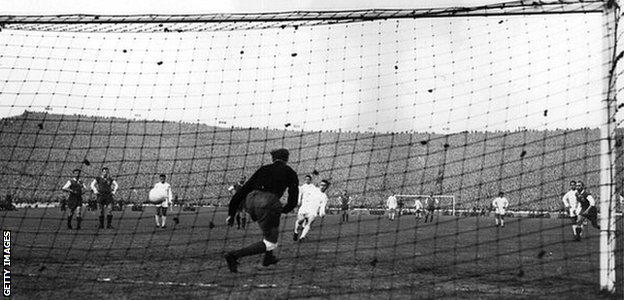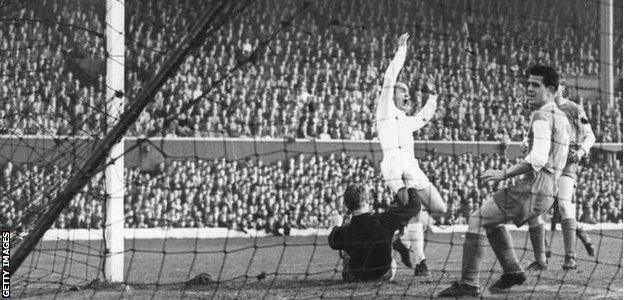1960 European Cup final: Real Madrid v Eintracht Frankfurt at Hampden
- Published

Ferenc Puskas scores from the spot at Hampden
A young Andy Roxburgh couldn't believe what he was seeing at Hampden that night. As if he didn't have enough to be astonished by in his heroes Ferenc Puskas, Alfredo di Stefano and Luis del Sol, he couldn't take his eyes off Paco Gento, arguably the most exciting player in the global game in that year of 1960.
In training, Gento stayed out on his favoured left wing, smoking, as his manager Miguel Munoz halted play to make a point. Once the action resumed, Gento, a scorer in Real's European Cup final victories in 1957 and 1958, flicked the cigarette to the floor and took off like a missile, seizing on a pass, dribbling inside and lashing a shot into the top corner before returning for another puff.
Roxburgh, a youth player at Queen's Park, was mesmerised and, 24 hours later, the rest of the football-loving world would be in similar, trance-like state as Real won a fifth straight European Cup by beating Eintracht Frankfurt 7-3 in one of the most storied games the sport has ever known and in front of a record crowd of 127,621.
Queuing around the block & the not-so-Blond Arrow
We can all recall the outline of the story. How a teenage Alex Ferguson was wowed by Real. How Billy McNeill and other soon-to-be-Lisbon-Lions were also in the crowd, every bit as gobsmacked as Ferguson, who knew a bit about Eintracht having watched them obliterate Rangers in the semi-finals.
They had won won 6-1 in Frankfurt and 6-3 in Glasgow. In his wildest imagination Ferguson couldn't envisage any team, even one as great as Real, destroying them like they did. Eintracht were a team with no superstars. They didn't have a solitary player in West Germany's World Cup squad from two years before - and didn't have one in their World Cup squad two years later either - but they still had quality. Ferguson reckoned they were the greatest side he'd ever seen.
They had Erwin Stein up front, a physical striker with pace and a deadly finisher who'd scored 24 goals in 30 games in the German Oberliga and another seven in five in the cup. Stein's understanding with Richard Kress, the outside right, was uncanny. Kress was lightning quick himself. The outside left was Erich Meier, who had scored twice at Ibrox. In the middle of the park they had Dieter Lindner and Alfred Pfaff. Lindner had scored three goals against Rangers across the two leg; Pfaff had scored four.
Glasgow football folk queued down the street and around the corner on the day tickets went on sale. In the years since, the players involved have spoken of the atmosphere at Hampden, the extraordinary noise, the huge understanding and appreciation the people had for what they were seeing, which was greatness, nothing less.
The special nature of if was only heightened when Eintracht exploded out of the blocks. Meier hit the crossbar inside a minute. Kress and Pfaff forced saves out of Rogelio Dominguez soon after. Then Kress scored. Hampden, willing on the underdogs, erupted in acclamation. They were to do a lot of that on the night.
Once Real settled, the full majesty of the team unfolded and it was Di Stefano, as ever, who orchestrated it. He was 34 and no longer went by his early nickname, the Blond Arrow, but he was still the man - arrogant and brilliant in equal measure. Even in the twilight of his career his stamina and ability to control games was breathtaking. Everything went through him. Everything.
One of the greatest illustrations of his revered status came on the final day of the 1958-59 league season. Di Stefano and Puskas were level on goals going into that match. In the decisive moment, Puskas rounded the opposition goalkeeper and instead of burying it in the empty net he passed to Di Stefano, who scored. Puskas knew that for all his own genius, Di Stefano was still the boss at the Bernabeu.
Di Stefano was many players in one. He was an attacking midfielder, a defensive midfielder and a centre-forward. Eintracht weren't the only team to lose themselves in trying to deal with him. He'd scored in each of the previous four European Cup finals and here he netted again to make it 1-1 and once more to make it 2-1.

Alfredo di Stefano celebrates putting Real into a 2-1 lead at Hampden
Four goals & an apology
Puskas scored the next four. His renaissance was something else. When he joined Real in 1958 he did so as a shadow of the Galloping Major of the Mighty Magyars, one of the greatest national teams to ever grace a pitch. Puskas had let himself go somewhat. "I can't play, I'm too fat," he told his Real suitor, Santiago Bernabeu. Real signed him anyway.
His four goals in the final were like salt rubbed into a wound in more ways than one. Six years before, after his Hungary team had lost the World Cup final to West Germany, he had accused his opponents of doping. Even though he later retracted the comments, he wasn't forgiven.
The German football authorities banned any of their sides from playing against a team with Puskas in it. The Hungarian had to make a formal apology before the final went ahead. That's where his contrition ended. His four goals brought his European Cup tally to 12 for the season. When he finished his time in Madrid, he had 240 goals in 260 games.
Real's short passing networks did for Eintracht. They knew of Puskas' ruthlessness but couldn't shut him down. They knew of the burning pace of Gento on one side and the exquisite, and almost forgotten, Brazilian Canario on the other but couldn't hold them back. They knew what Del Sol could do but his rapid movement was too much for them.
Above all, they feared Di Stefano's threat but didn't know how to cope with him when he dropped deep to conduct and then arrived undetected in the box to threaten. He was a shadow to them. This was a Real team so talented that they could afford to leave Didi out of the squad. Didi had been voted player of the tournament when his Brazil team won the World Cup two years earlier. He won another World Cup in 1962. Good enough for Brazil, but not good enough for Real.
Eintracht never give up that night. Stein made it 6-2 before Di Stefano claimed his hat-trick. Then Stein scored again to make it 7-3. Real now had five European Cups. The first of them, against Reims, was dramatic in the sense that they trailed 2-0 and 3-2 and yet found a way of winning. The third was another nail-biter, an extra-time victory over Milan.
What happened at Hampden trumped the lot, though. Those who were there talk almost in hushed tones when recalling it, as if they'd seen some kind of football apparition. In a sense, that was exactly what they'd witnessed.